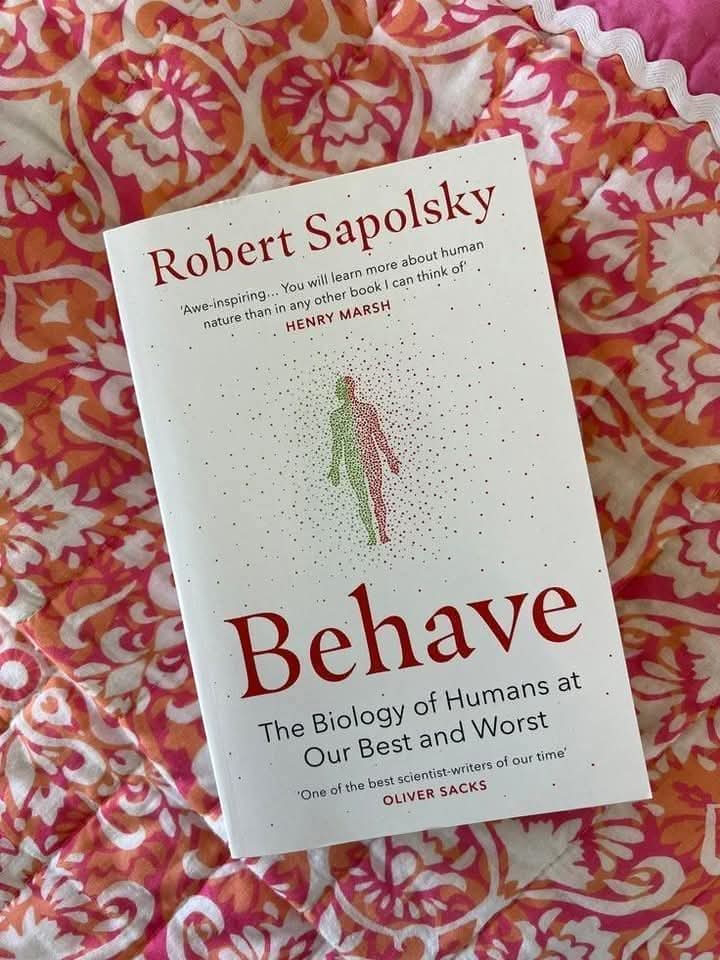This book offers a deep dive into the complexities of human behavior, spanning from split-second brain activity to evolutionary influences over millennia. Whether it's understanding aggression, empathy, or morality, Behave provides profound insights into what drives humanity at its best and worst moments.
10 Lessons from Behave by Robert M. Sapolsky
1. Behavior is Influenced by Multiple Time Scales
Sapolsky explains that behavior is shaped by factors acting over different time scales:
Seconds before an action: Brain activity, particularly in the amygdala and prefrontal cortex, determines immediate responses.
Hours or days before: Hormonal fluctuations and physiological states influence decisions.
Years or decades before: Life experiences, cultural norms, and social environments shape long-term behavior.
Millennia before: Evolutionary pressures have left their mark on how humans behave today.
2. The Role of the Brain in Split-Second Decisions
The prefrontal cortex (rational decision-making) and the amygdala (emotional responses) are key players in human behavior. The balance between these regions often determines whether a person acts impulsively or rationally.
3. Genes are Not Destiny
Sapolsky highlights that while genetics play a role in behavior, they interact with environmental factors. Life experiences, upbringing, and even societal norms can override genetic predispositions, proving that behavior is malleable and context-dependent.
4. Hormones Influence Behavior, but They’re Not the Sole Factor
Hormones like testosterone, oxytocin, and cortisol significantly affect behavior. For example:
Testosterone is often linked to aggression, but its effects are context-dependent and influenced by social situations.
Oxytocin, known as the "bonding hormone," can foster trust and empathy, but it can also amplify in-group favoritism and out-group hostility.
5. Empathy Has Biological Roots
Human empathy is deeply rooted in biology. Mirror neurons, which fire when we observe others' actions or emotions, play a critical role in fostering understanding and connection. However, empathy is selective and often stronger for those perceived as similar or familiar.
6. Morality is Shaped by Evolution and Culture
Morality is a complex interplay between biology and societal norms. Sapolsky explains that evolutionary pressures have favored cooperation and altruism within groups, but cultural influences often dictate how morality is expressed or enforced.
7. Aggression is Context-Dependent
Aggression isn’t a fixed trait but rather a response to specific circumstances. Factors like resource scarcity, perceived threats, or social hierarchies can trigger aggression. However, humans also have the capacity to regulate aggression through empathy and societal structures.
8. Group Identity Drives Behavior
Sapolsky explores how group identity shapes human behavior, often leading to in-group favoritism and out-group hostility. This tendency has evolutionary roots but can be mitigated by fostering shared identities and intergroup cooperation.
9. Free Will is More Complicated Than We Think
Sapolsky argues that free will is a complex concept, as much of human behavior is influenced by subconscious processes, biological predispositions, and external factors. However, understanding these influences can empower people to make more conscious choices.
10. Change is Possible Through Awareness and Effort
Despite the biological and environmental factors shaping behavior, humans have the capacity for change. Sapolsky emphasizes the importance of self-awareness, education, and societal reform in creating environments that encourage compassion, cooperation, and growth.
Behave by Robert M. Sapolsky is a monumental work that sheds light on the intricate forces shaping human behavior. By examining everything from neurobiology to cultural dynamics, Sapolsky provides a comprehensive understanding of why humans act as they do—and how we can strive to be better.
GET BOOK: https://amzn.to/3DEaC4F
You can ENJOY the AUDIOBOOK when you register for Audible Membership using the link above.


No comments:
Post a Comment